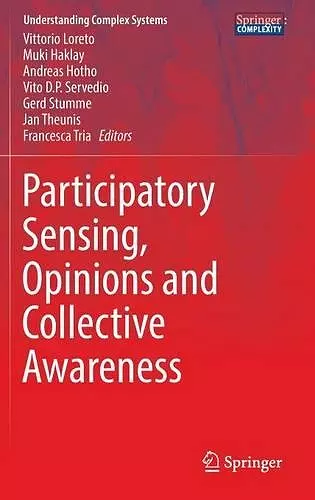Participatory Sensing, Opinions and Collective Awareness
Andreas Hotho editor Muki Haklay editor Vittorio Loreto editor Vito DP Servedio editor Gerd Stumme editor Jan Theunis editor Francesca Tria editor
Format:Hardback
Publisher:Springer International Publishing AG
Published:19th Aug '16
Currently unavailable, and unfortunately no date known when it will be back

This book introduces and reviews recent advances in the field in a comprehensive and non-technical way by focusing on the potential of emerging citizen-science and social-computation frameworks, coupled with the latest theoretical and modeling tools developed by physicists, mathematicians, computer and social scientists to analyse, interpret and visualize complex data sets.
There is overwhelming evidence that the current organisation of our economies and societies is seriously damaging biological ecosystems and human living conditions in the short term, with potentially catastrophic effects in the long term. The need to re-organise the daily activities with the greatest impact – energy consumption, transport, housing – towards a more efficient and sustainable development model has recently been raised in the public debate on several global, environmental issues. Above all, this requires the mismatch between global, societal and individual needs to be addressed. Recent advances in Information and Communication Technologies (ICT) can trigger important transitions at the individual and collective level to achieve this aim.
Based on the findings of the collaborative research network EveryAware the following developments among the emerging ICT technologies are discussed in depth in this volume:
• Participatory sensing – where ICT development is pushed to the level where it can support informed action at the hyperlocal scale, providing capabilities for environmental monitoring, data aggregation and mining, as well as information presentation and sharing.
• Web gaming, social computing and internet-mediated collaboration – where the Web will continue to acquire the status of an infrastructure for social computing, allowing users’ cognitive abilities to be coordinated in online communities, and steering the collective action towards predefined goals.
• Collective awareness and decision-making – where the access to both personal and community data, collected by users, processed with suitable analysis tools, and re-presented in an appropriate format by usable communication interfaces leads to a bottom-up development of collective social strategies.
ISBN: 9783319256566
Dimensions: unknown
Weight: 7745g
405 pages
1st ed. 2017